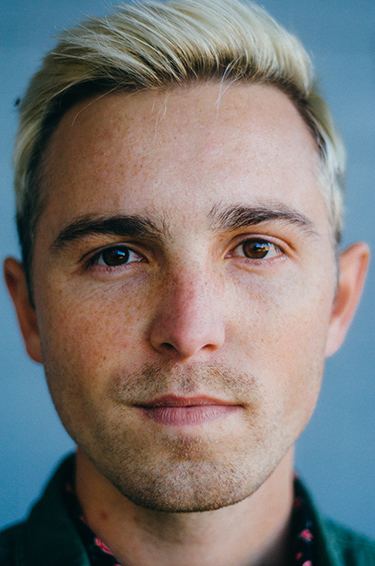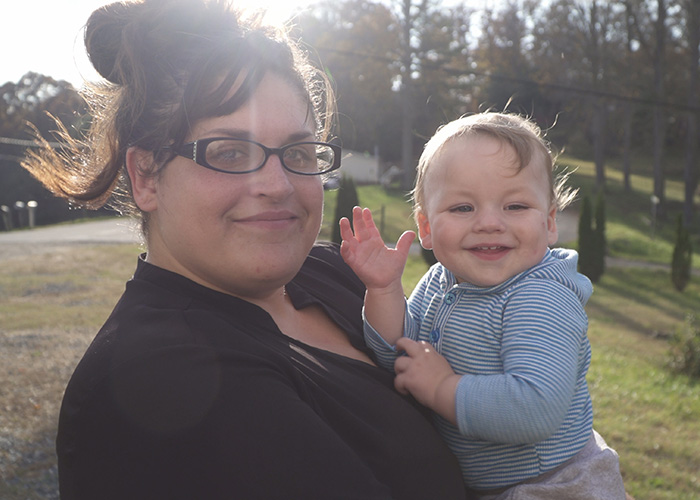Communication Alum Directs Original Documentary on Mothers Struggling with Opioid Addiction
By Kylie Gray
May 03, 2018
“One time I was in rehab, and they were talking about how there is an original body of pain. And you create more pain on top of that trying to handle the original thing that hurt you.”
So recalls Ashley Ramey in the trailer for “Original Body of Pain,” a documentary about motherhood and opioid addiction co-directed by Stan Wright, BA Communication ’15, and Dominic Silva, both MFA students at Wake Forest University. Ramey is a mother from Asheville, North Carolina, and one of the main characters in the film, which follows three women over the course of one year.
“We read a lot in the news about the opioid crisis and see often salacious portraits of addiction. They show people shooting up and really at the lowest points in their lives. With this film, we wanted to show the counterpoint: to look beyond the drug use and consider the entire breadth of someone’s story,” says Wright.
Wright and Silva have spent the last two years filming and building relationships with the documentary’s main characters: Ramey and her three children; new mom Lisa Dalton; and Joanna Christoph, BSN, RN, a home health pediatric nurse who specializes in addiction.
 Drexel alumnus Stan Wright, BA Communication ’15
Drexel alumnus Stan Wright, BA Communication ’15
Wright, a former editor-in-chief of Drexel’s student newspaper The Triangle, encountered the power of visual storytelling as a co-op student at PHL17 television station — filming elderly air force veterans as they boarded warplanes for the first time in decades. With a firm undergraduate foundation in journalism and video production, Wright was accepted to several graduate documentary film programs. He chose Wake Forest in part because of its proximity to Asheville, where his aunt is a nurse researcher of women’s and children’s health.
“I’m from California, but I’ve spent every summer since I was little in Asheville, and it’s become a second home. The film started with a curiosity about something going on in my own backyard that I didn’t know enough about,” he says. “The more my co-director and I dove into this film — the more women we talked to and the more families we connected with — we learned about the huge burden of stigma associated with this issue, and it became a passion project to burst that bubble.”
Frustrated by exploitative depictions of addiction, Wright chose to focus the documentary on a population he believes faces some of the sharpest judgement — mothers who struggle with addiction.
“This population is the most harshly judged given the parenting component and the fear of harm to a child,” he says. “A big concern of ours was our ethical approach to the film, recognizing that this is a vulnerable population. It was important for us to not take advantage of their stories.”
Wright and Silva spent the first year of their three-year program performing outreach, building relationships and interviewing addiction counselors, home nurses, nurse practitioners and recovering addicts. They settled on the film’s featured women with the goal of providing diverse perspectives on motherhood and addiction — touching on the women’s relationships with social services, feelings of guilt and shame surrounding their relationships with their children, and a medical perspective from a woman who enters households affected by addiction daily.
“We are not trying to pass the film off as the addiction experience of everyone in America, but as one entry in a broader conversation. It is an empathetic look at addiction rooted in factual and journalistic sensibilities,” he says. “People tend of think of addiction as a moral failing, but a ton of research supports that it is a brain-based disorder with complex genetic and social underpinnings.”
The documentary seeks to change perceptions and challenge misinformation surrounding addiction, while providing realistic portraits of women and families who struggle with it. This goal has taken Wright and Silva through some intense moments — from their first shoot at a nurse’s home visit, where they witnessed an infant in withdrawal, to relapses and the birth of Dalton’s son. Yet they have also been present for children’s birthday parties and other intimate family moments, forming a lasting bond with the families in the process.
 Ashley Ramey with her son
Ashley Ramey with her son
“Our stories have become entwined with theirs in many ways,” Wright says. “We have become their friends and advocates. I can’t pretend to say that the film will change any laws, but I think this is an issue in which laws are so informed by people’s opinions. We’ve seen that punitive approaches haven’t worked as well as rehabilitation. That’s why it’s important to change hearts and minds about the reasons people deal with addiction.”
“Original Body of Pain” is currently in the final stages of post-production, and will be screened as a work in progress at the annual gathering of the University Film and Video Association at New Mexico State University this July.
Wright and Silva have started a Kickstarter campaign, which ends May 9, to help fund the documentary’s final edit and broaden its reach. They plan to create related educational materials, host regional screenings and use the film to help educate medical professionals about experiences with addiction. In January, the pair was awarded a $5,000 outreach and impact grant from Wake Forest’s Center for Bioethics, Health and Society to support these efforts.
Wright will spend the months following graduation submitting the documentary to film festivals before applying for positions at production companies. His experience with the documentary has solidified his desire to make films related to social issues.
“I want my film work in the future to be substantive and focus on real issues, but with an underpinning of humanity and emotion. I learned from every stage of this process how to step back and let the characters tell their stories,” he says.